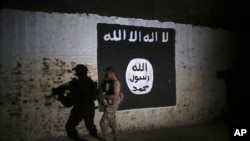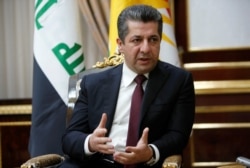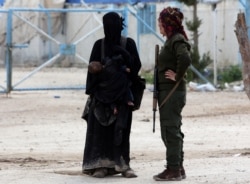Iraqi Kurdish officials announced Monday that their counterterrorism unit arrested five Islamic State (IS) suspects who had penetrated the autonomous Kurdistan Region from war-torn Syria to carry out explosions and assassinations in the region's capital, Irbil.
The announcement included a televised confession with five suspects and a statement from Masrour Barzani, the prime minister of the Kurdistan Regional Government (KRG).
Barzani said all the suspects had come from Syria's al-Hol camp, which houses more than 60,000 refugees, internally displaced Syrians, and family members of former and current IS terrorists.
"I am deeply concerned that our intelligence points to (IS) operating from the al-Hol camp, indicating the group is still capable of crossing borders illegally," Barzani said in a statement published on KRG's website.
"I urge the global coalition and our partners to recognize the seriousness of this threat, both here and abroad, to peace and stability," he added.
U.S.-backed Syrian Democratic Forces (SDF) recently conducted a major security operation against IS cells inside al-Hol. Dozens of IS operatives were detained in the multiday campaign.
In the confession video, all five suspects said they were Iraqi nationals who had joined IS before the group's caliphate was declared defeated in 2017. Speaking with an Iraqi accent of Arabic, they explained how they made it to Irbil in a journey that spanned three countries, including Turkey and Iran.
They also said the group's new caliph, Abu Ibrahim al-Hashimi al-Quraishi, known by his nom de guerre Haji Abdullah, had personally authorized the mission to destabilize the northern region, adding that they were awaiting explosive materials and silencers to begin carrying out their missions.
Regional cooperation
Some experts warn that IS's continued ability to cross borders serves as a reminder that the region's state and non-state actors need to cooperate more closely with one another to contain the threat.
IS "emerged in Syria first before it invaded Iraq in 2014," said Bilal Wahab, an Iraq analyst at the Washington Institute for Near East Policy.
"That history could repeat itself unless the Iraqi government, the KRG, and the SDF cooperate with each other and the international coalition against IS," he told VOA.
Observers say the KRG does not enjoy optimal political relations with either the federal government in Baghdad or SDF, leading to poor counterterrorism cooperation among them.
Last month, the KRG and Baghdad reached a breakthrough in their financial disputes, allowing the Parliament to pass the budget law for the 2021 fiscal year.
Long-standing issues, however, remain between the two governments over the so-called disputed territories in the north, where experts say IS has found a foothold in recent years.
Relative peace
Terror attacks have been rare in the Kurdistan Region, which has enjoyed relative peace since the 2003 U.S.-led invasion of Iraq. The oil-rich enclave has turned into an investment hub for American and European businessmen in recent years.
In February, Kurdish and U.S. officials accused an Iran-backed militia of involvement in a bloody rocket attack, targeting a U.S. military base in Irbil. The attack left an unidentified civilian contractor dead and several Americans injured. One of several rockets hit a residential compound, wounding at least two local civilians.
The incident prompted U.S. President Joe Biden to authorize his administration's first airstrikes against Iranian proxy groups, targeting bases used by Kait'ib Hezbollah and Kait'ib Sayyid al-Shuhada.
"This proportionate military response was conducted together with diplomatic measures, including consultation with coalition partners," Pentagon press secretary John Kirby said following the U.S. attack in Syria.
"The operation sends an unambiguous message: President Biden will act to protect American and coalition personnel," Kirby added.






